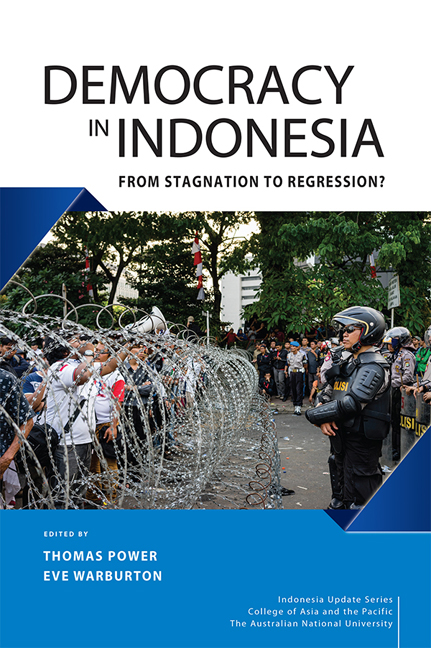Book contents
- Frontmatter
- Contents
- Tables and Figures
- Contributors
- Foreword
- Acknowledgments
- Glossary
- 1 The decline of Indonesian Democracy
- Part 1 Historic al and Comparative Perspectives
- Part 2 Polarisation and Populism
- Part 3 Popular Supp ort for Democracy
- Part 4 Democratic Institutions
- Part 5 Law, Security and Disorder
- Index
- Indonesia Update Series
3 - Indonesia’s tenuous democratic success and survival
Published online by Cambridge University Press: 24 November 2020
- Frontmatter
- Contents
- Tables and Figures
- Contributors
- Foreword
- Acknowledgments
- Glossary
- 1 The decline of Indonesian Democracy
- Part 1 Historic al and Comparative Perspectives
- Part 2 Polarisation and Populism
- Part 3 Popular Supp ort for Democracy
- Part 4 Democratic Institutions
- Part 5 Law, Security and Disorder
- Index
- Indonesia Update Series
Summary
Democracy is receding and authoritarianism is rising across the globe. Against this ominous backdrop, Indonesia has long stood out as a relative success story—albeit an increasingly tenuous one. This essay offers a historically grounded explanation for why Indonesia has achieved the relative democratic success that it has over the past two decades. It also aims to clarify the exact ways in which Indonesian democracy has faltered and remains most vulnerable to further backsliding. My point of departure is a conviction that explaining democratic success requires thorough attention to the variety of ways that democracies can fail.
My argument for why Indonesian democracy has surprisingly succeeded centres on the historical inheritances the country enjoyed when transitioning to democracy in 1998–99: specifically, (1) egalitarian nationalism inherited from before the authoritarian period, and (2) institutional developments inherited from the authoritarian period itself. I argue that these historical inheritances best explain why Indonesia has managed to avoid the four major pitfalls that new democracies so often confront: state failure, military takeover, electoral authoritarianism and illiberal democracy.
However, I also argue that Indonesia has not fully escaped, and can never fully escape, the fourth danger: illiberal democracy. Whether Indonesia will avoid succumbing to an illiberal democratic fate depends largely on whether its deep but increasingly distant inheritance of egalitarian nationalism can withstand the challenges of those who would undermine and undo it. Indeed, it has been Indonesia's lingering vulnerability to illiberal democracy that explains the softness in the country's democracy rating. But it is vital to appreciate that the three other main threats to democracy—state failure, military takeover and electoral authoritarianism—have all been successfully evaded. I expect those critical escapes to continue, and these are no small accomplishments.
In the following section I explain why the egalitarian nationalism that arose during Indonesia's fierce independence struggle and the institutional development that occurred under Suharto's authoritarian New Order regime (1966–98) have given Indonesia a set of historical inheritances that have helped its democracy take root. The subsequent section distinguishes the four common pitfalls that democracies face and details how Indonesia's historical inheritances have served as resources for avoiding each of those pitfalls. The conclusion remarks on the enduring and even endemic danger of illiberal democracy, not just in Indonesia but across the democratic world.
- Type
- Chapter
- Information
- Democracy in IndonesiaFrom Stagnation to Regression?, pp. 45 - 60Publisher: ISEAS–Yusof Ishak InstitutePrint publication year: 2020



